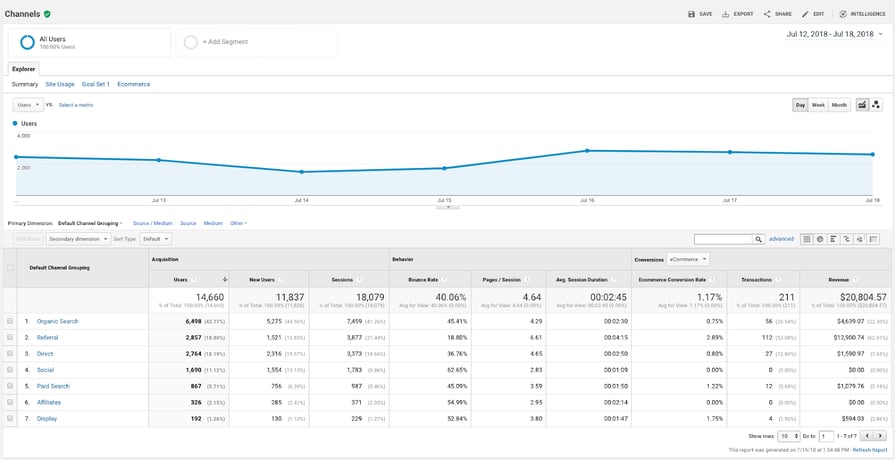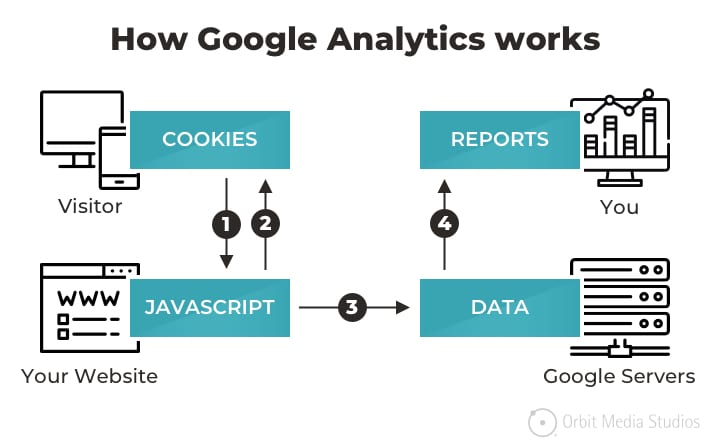Everything You Need to Learn about When Does the Google Analytics Tracking Code Send an Event Hit to Analytics
Everything You Need to Learn about When Does the Google Analytics Tracking Code Send an Event Hit to Analytics
Blog Article
Master Web Site Insights With Accurate Google Analytics Monitoring Code
The effective use of Google Analytics rests on the precise implementation of its tracking code, a fundamental step commonly forgotten by internet site owners. This seemingly simple JavaScript snippet, when correctly placed, becomes the foundation of information collection, offering insights right into individual actions and website efficiency. Nevertheless, challenges can develop during arrangement, possibly skewing the information and bring about mistaken decisions. Understanding these ins and outs is necessary for maximizing the advantages of analytics. What are the typical mistakes that could weaken your monitoring efforts, and how can you make certain precision in your approach?
Understanding Google Analytics Essentials
Google Analytics is a necessary tool for web site owners and marketers, supplying important understandings into customer behavior and site efficiency. At its core, Google Analytics collects information concerning visitors to a website, permitting users to examine metrics such as website traffic sources, customer involvement, and conversion prices. Recognizing these fundamentals is important for maximizing a website's efficiency and enhancing user experience.
The platform utilizes cookies to track communications, tape-recording data such as page views, session durations, and bounce rates. This info is accumulated and offered through personalized dashboards, allowing individuals to envision patterns over time. Trick efficiency indications (KPIs) can be kept track of, such as the overall number of individuals, new versus returning site visitors, and the geographical circulation of the audience.
Additionally, Google Analytics supplies division attributes, enabling customers to separate specific traffic sources or individual demographics for more targeted evaluation. By mastering these foundational aspects, site proprietors can make enlightened choices regarding material approach, advertising and marketing projects, and general site enhancements. Eventually, comprehending Google Analytics fundamentals is vital for leveraging information to drive growth and achieve business objectives effectively.
Establishing Up Your Monitoring Code

Replicate the provided tracking code and paste it into the HTML of your site. Ideally, this code should be put in the header section of every page you wish to track. This makes certain that the tracking code loads prior to any kind of various other web content, allowing it to record information properly. There are plugins available that simplify the assimilation procedure. if you are using a content administration system (CMS) like WordPress.
After installment, confirm that the tracking code is operating appropriately by utilizing Google Tag Assistant or the Real-Time records in Google Analytics - when does the google analytics tracking code send an event hit to analytics?. This action is necessary to confirm that your information collection is accurate and energetic, setting the foundation for insightful evaluation
Common Monitoring Code Issues
Many internet site proprietors experience usual issues with their Google Analytics tracking code that can prevent data collection and evaluation. One prevalent problem is incorrect installment. This may take place when the monitoring code is positioned in the wrong area of the site's HTML, often bring about incomplete or absent information. Furthermore, having numerous circumstances of the tracking code on a solitary web page can result in filled with air metrics, as individual communications could be counted extra than as soon as.
An additional concern occurs from making use of advertisement blockers, which can protect against the tracking code from performing altogether, therefore skewing information. when does the google analytics tracking code send an event hit to analytics?. In addition, read the article failing to configure filters properly can cause the exemption of essential traffic resources or the inclusion of unwanted referral spam, distorting the data gathered
Web site proprietors might also neglect the significance of tracking code updates, especially when migrating to Google Analytics 4 (GA4) from Universal Analytics. Lastly, not enough screening before launching changes can result in undetected mistakes in the monitoring code, additionally complicating information reliability. Dealing with these common issues is vital for making certain exact monitoring and insightful analytics.
Analyzing Web Site Data Efficiently
Accurate information collection is only the primary step in leveraging Google Analytics; the actual worth lies in effectively analyzing that information to drive enlightened decision-making. To attain this, it is important to recognize essential performance indicators (KPIs) that straighten with your organization goals. Focus on metrics such as conversion rates, customer interaction, and traffic resources, as these will certainly offer understandings into user actions and the general effectiveness of your site.
Utilizing Google Analytics' division functions enables a much deeper understanding of your you can look here target market. By breaking down information into certain demographics, habits, and traffic networks, you can uncover trends and patterns that inform targeted methods. Implementing custom-made records and dashboards can simplify this process, making it possible for fast accessibility to important information.
Additionally, frequently evaluating information fads in time assists to identify abnormalities and possibilities for improvement. Make use of visualization tools to present information in a conveniently absorbable layout, helping with extra efficient interaction with stakeholders. Ultimately, the capability to analyze internet site data successfully encourages businesses to make calculated choices that enhance individual experience, enhance marketing initiatives, and drive development.
Best Practices for Accurate Tracking
Carrying out efficient tracking practices is critical for acquiring reputable information in Google Analytics. To make certain precise tracking, start by correctly mounting the Google Analytics tracking code on every web page of your website. This can be completed with a tag supervisor or by straight embedding the code right into the HTML.
Next, configure your Google Analytics account to omit inner traffic. This can be done by establishing up filters that recognize and get rid of visits from your organization's IP address, therefore protecting against skewed data. Furthermore, make use of occasion tracking to monitor certain customer communications, such as downloads or video plays, which standard page sights might overlook.
Regularly audit your tracking configuration to validate that all features, such as goals and ecommerce monitoring, are operating effectively. Develop a constant naming convention for your occasions and campaigns to help with much easier coverage and evaluation.
Lastly, think about leveraging UTM specifications for projects to acquire understandings right into the efficiency of various advertising and marketing efforts. By complying with these ideal practices, you can enhance the precision of your data collection and analysis, ultimately leading to even more informed decision-making for your website.
Conclusion
Accurate execution of the Google Analytics tracking code is necessary for mastering site insights. By making sure the tracking code is correctly placed and on a regular basis audited, website owners can capture important user interaction information, therefore helping with the identification of vital performance indications. Reliable analysis of this data, incorporated with adherence to best techniques, makes it possible for notified decision-making and the optimization of online approaches. Inevitably, a robust tracking structure improves the capability to drive engagement and boost general website performance.

Insufficient screening before launching adjustments can result in unseen mistakes in the tracking code, further complicating data integrity.Applying efficient monitoring techniques is vital for acquiring trustworthy information in Google Analytics. By making certain the tracking code is correctly positioned and consistently audited, site owners can record important user interaction information, therefore helping with the recognition of crucial efficiency signs.
Report this page